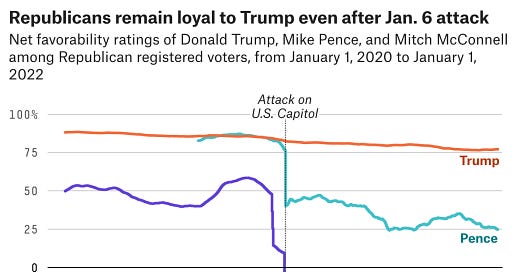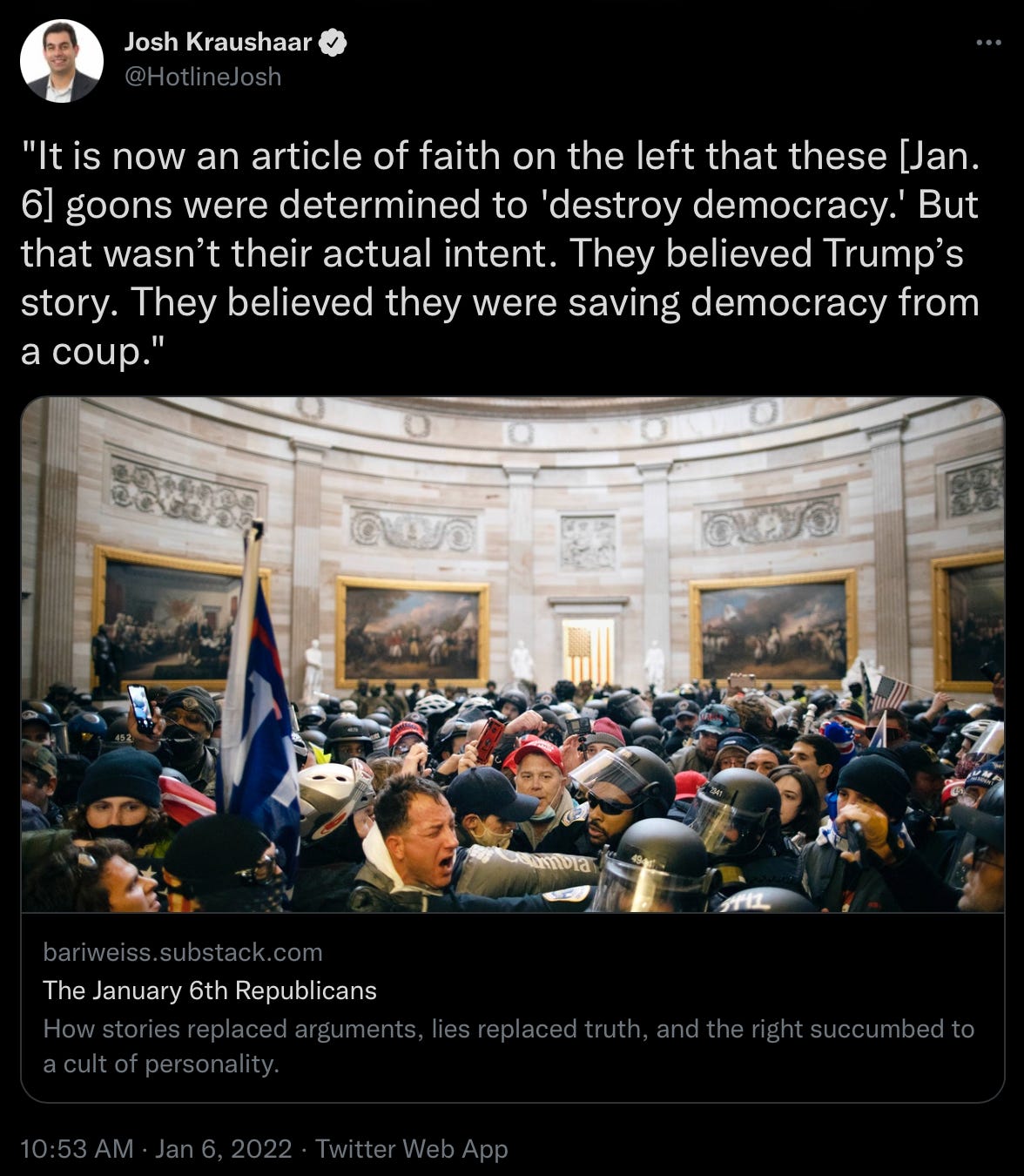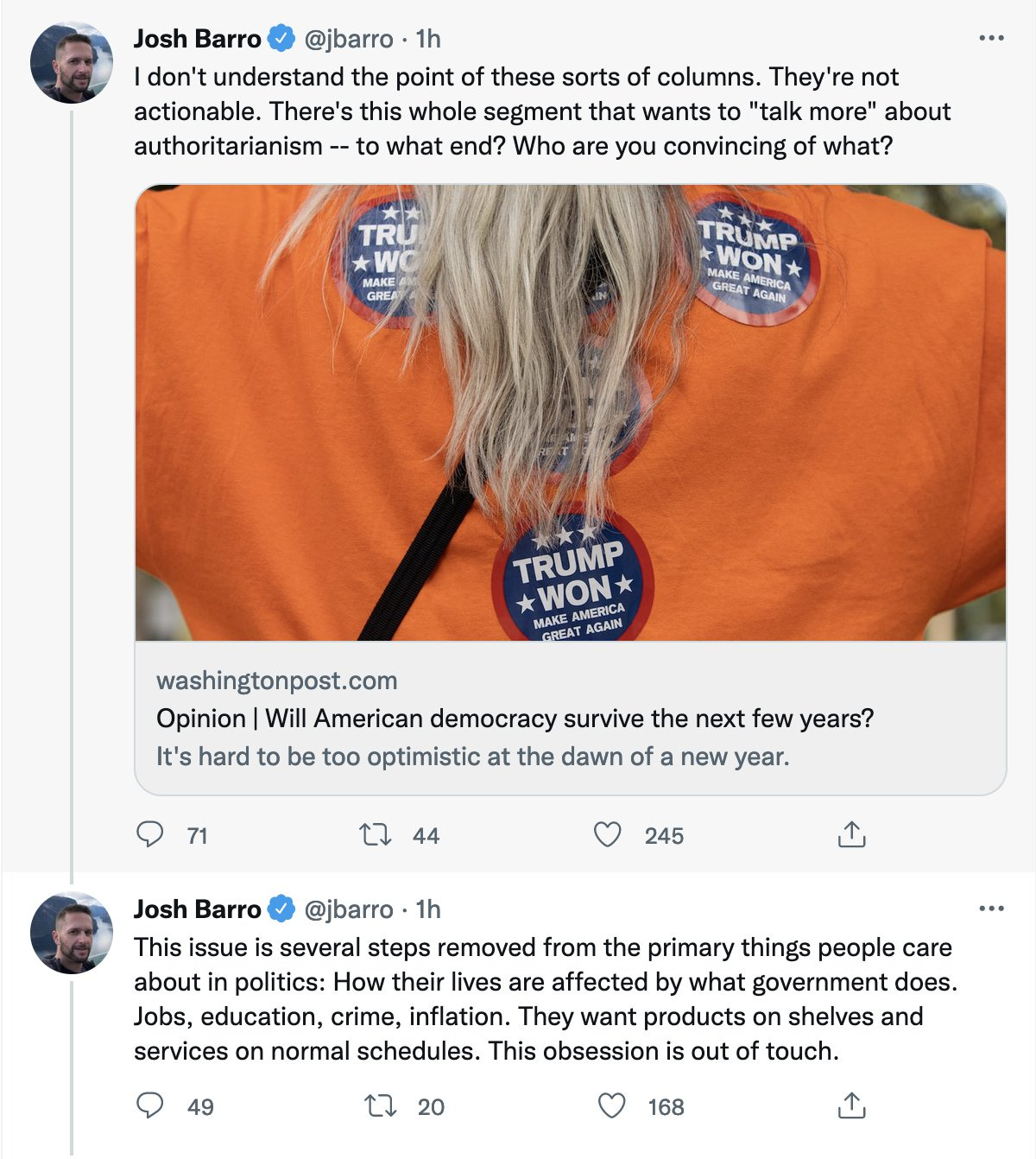The leader versus follower debate in an age of democratic decline | No. 178 — January 9, 2022
Commentators urging journalists to write about bread-and-butter issues because "that's what voters want" are missing the point of politics — and democracy
As this week’s newsletter comes just after the year anniversary of the January 6th attempted coup, I think it’s fine to depart from the usual focus on political data to cover what we know about how to increase support for democracy — or at least prevent further degradation. I hope you feel this is appropriate, too, and enjoy this week’s article.
I try not to call people out for their bad tweets, but this post from Josh Kraushaar, the political editor of National Journal, strikes me as emblematic of a broader problem with political coverage of America’s democratic decline — so I’m making an exception. In the tweet, Kraushaar quotes from a newsletter item by Bari Weiss which aims to excuse the behavior of many of Donald Trump’s supporters who violently stormed the US Capitol on January 6th, 2021.
To prove that I’m not ganging up on Kraushaar, here’s another set of tweets from political commentator Josh Barro that I find equally bad (mostly the latter one):
Aside from the narrow arguments over the utility of ceaseless alarm-raising about democracy, which likely does have diminishing returns (as does coverage of every subject!), I think Kraushaar and Barro are really just missing the point of politics altogether. And, weirdly for prominent members of the press, they also seem to have forgotten the role they play in crafting a culture of democracy and civic-mindedness among the people they are supposed to serve.
Back to Barro’s tweet, it is true that the median voter likely does not think about the substance or consequences of attacks on voting and democracy very often. I think it is almost assured that democratic decline is not driving voter behavior among a significant percentage of the mass public.
But this is not a reason for journalists to not raise the alarm! It does not follow from a reading of voter priorities that an obsession with democracy among the political elite is therefore wrong by virtue of them being “out of touch.” And here is why: Voters respond to messages from political leaders — mostly elected officials, but also opinion leaders such as journalists and commentators — by adopting the preferences of the side they agree with.
There are decades of work on this subject. But before we get there, just take a look at the chart from the staff at FiveThirtyEight. It shows that Republicans became much less favorable to Mike Pence and Mitch McConnell after they broke with Trump over the validity of the 2020 election and the actions of his supporters on January 6th, 2021:
We know that a moderating force here is attitudes on the 2020 election because we have other work that randomly exposes a treatment group of survey respondents to Donald Trump’s opinions on the election and measures their opinions relative to a control group. Here are the findings from one set of experiments conducted in October of 2020:
In this case, the researchers showed survey respondents real tweets from Donald Trump — the treatment is not some abstract experiment, but his actual words. They find that exposing voters to his tweets “erodes trust and confidence in elections and increases belief that the election is rigged among people who approve of Trump’s job performance.” Further, they say their results “suggest that rhetoric from political elites can undermine respect for critical democratic norms among their supporters.”
When it comes to mass support for democracy, then, we must conclude the political class plays a key role. The political scientist John Zaller wrote that the presence of “non-attitudes” among the public on any given issue thus necessitated competition among elites to provide information and attitudes to the people. In this model, political leaders are, well, leaders — not simply followers.
What Kraushaar and Barro get wrong is in assuming the causal arrow points the other way. The idea that elites ought only to care about the things voters give a high premium to at any moment is obviously foolish. But, more than that, when it comes to mass support for democracy, their ambivalence is not only foolish but dangerous. After reading these studies, it sure seems like tweeting about how Americans care about inflation and crime instead of the sovereignty of their votes in the political process is actually just giving them permission to do so.
One great irony is that we’re hearing this from a group of commentators who defend the US Senate on the grounds that political leaders ought to be insulated from the democratic whims of the populace. I am tempted to write that they clearly don’t care about democracy at all, but that would be disingenuous. I think it’s likelier that they just don’t understand voters as well as they purport to. They certainly haven’t engaged with the political science or grappled with the crucial role they play in our democracy.
To riff on the kicker from a column by David Brooks this week, the optimal take when confronted with a house on fire is not to point out that voters don’t really care about funding firefighters, but to find yourself a hose and shoot water at the base of the flames.
This is obviously an exaggeration of the “leader” versus “follower” debate over how elected officials and journalists should act in accordance with public opinion. What I’m really saying is that, when it comes to democracy, there is really no debate at all. The only choice is for leaders to lead. Especially in our age of hyper-partisan factionalism, the people are not going to do it themselves.
Posts for subscribers
If you liked this post, please share it — and consider a paid subscription to read additional in-depth posts from me. Subscribers received one extra post over the last week:
What I’m reading and writing
I am trying to read more this year — whether that be on how we communicate about data, new political science books, or more enjoyable works (despairing about democracy is not a good hobby). One way I’m attempting to incentivize myself is by keeping an online reading log — a personal Goodreads of sorts. The list is currently only one item long, and the page looks ugly, so I’m incentivized to add more books to it.
Here are a few other links about/around January 6th and the future of US democracy that I read and think you should read, too:
Osita Nwanevu says “Trump Isn’t the Only One to Blame for the Capitol Riot”
Ezra Klein says Democrats need a “plan B” to fight Trump and Trumpism, since anger and rage are not enough
Rick Hasen writes that “No One Is Coming to Save Us From the ‘Dagger at the Throat of America’”
And more towards the public opinion angle of this, I enjoyed this writeup of what surprised the NYT Opinion team from focus groups they conducted on issues surrounding January 6th
Thanks for reading
That’s it for this week. Thanks so much for reading. If you have any feedback, you can reach me at this address (or respond directly to this email if you’re reading in your inbox).









Elliott, what we need are the Influencers. Go, young ignorami! Influence your thousands of followers!